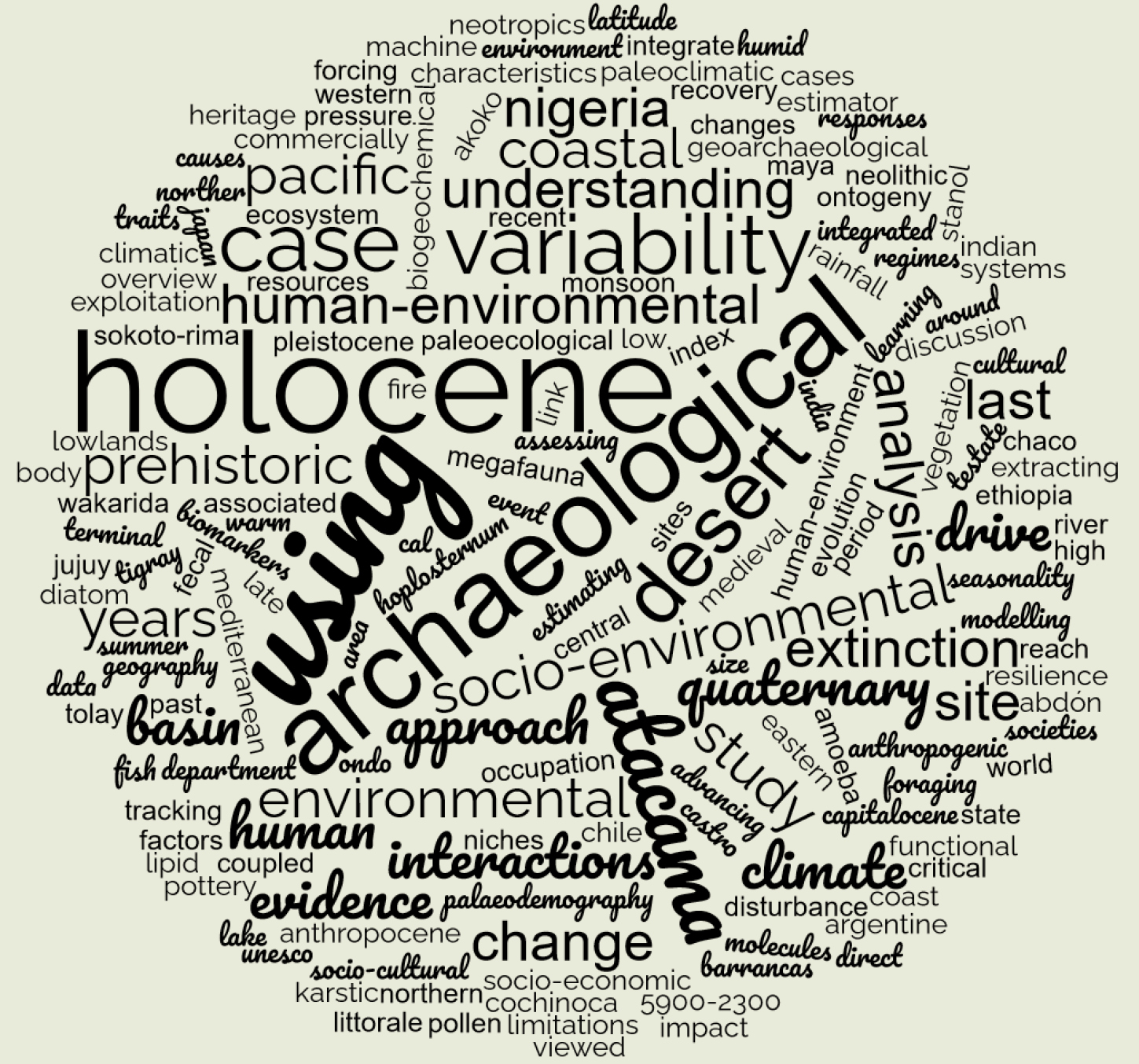- Home
- Publications
- PAGES Magazine
- Early-career Researchers Embrace Interdisciplinary Paleosciences: The Joint PAGES–INQUA Workshop
Early-career researchers embrace interdisciplinary paleosciences: The joint PAGES–INQUA workshop
Xavier Benito, I.A. Jara, G. Camperio, F. Charqueño, K. Davies, F. Ferrario, A.A. Isa, A.-M. Klamt, M. Mariani, N. Mehrotra, V. Merino and E. Akpo Orijemie
Past Global Changes Magazine
31(1)
48
2023
Xavier Benito , I.A. Jara
, I.A. Jara , G. Camperio
, G. Camperio , F. Charqueño
, F. Charqueño , K. Davies
, K. Davies , F. Ferrario
, F. Ferrario , A.-M. Klamt
, A.-M. Klamt , M. Mariani
, M. Mariani , N. Mehrotra
, N. Mehrotra , V. Merino and E. Orijemie
, V. Merino and E. Orijemie
La Serena, Chile, 20–24 November 2022
The workshop on Past Socio–Environmental Systems (PASES) took place in La Serena, Chile (pastglobalchanges.org/calendar/26972) and was organized by the early-career networks of PAGES (Past Global Changes) and INQUA (International Union for Quaternary Science).
The aim of the workshop was to provide a common platform for early-career researchers (ECRs) working on past climate–environment–cultural changes. The scientific essence of the meeting was to offer the opportunity to discuss different proxies and perspectives, as reflected by the titles of the presented talks (Fig. 1). An interdisciplinary approach is necessary for understanding socio–environmental systems: the complexity of the causal relations between the natural and human-driven forcings can be grasped by acquiring data and methods from different disciplines and interpreting them using a multiple working hypotheses framework.
 |
|
Figure 1: The diverse range of topics from the presentation titles at the PASES workshop represented in a word cloud. |
The workshop was held after a two-year postponement due to the COVID-19 pandemic, with the participation of 20 ECRs and four keynote speakers from 10 different countries from four continents. The meeting was held at the Archaeological Museum of La Serena, and coordinated by the Center for Advanced Studies in Arid Zones (CEAZA). The workshop consisted of three days of oral presentations, and included breakout activities, outreach talks involving high-school students and local communities, and a one-day field excursion.
Presentations were organized into three thematic sessions which provided scientific foci. The session on "Novel techniques in past human–environmental couplings" tackled recent advances in methods and proxies from sedimentary sequences for improving our understanding of human impacts on ecosystems. These methods range from functional approaches of biological proxies and biomarkers, to archaeological heritage conservation. During the session on "Socio–Environmental Systems in the Anthropocene", researchers presented provocative talks, such as the social component of the term "Anthropocene", and socio–economic responses to climate change in past archaeological societies. Finally, the "Synthesizing archaeological, paleoclimatic and paleoecological records" session presented a wide range of practical ways to integrate diverse records. These included paleo-monsoon dynamics and links with socio–cultural changes in India, and Late Quaternary extinction of megafauna in South America. Talks also revealed the importance of numerical approaches widely used across disciplines (e.g. machine learning, species distribution models) to decipher the dynamics of human–environmental relationships.
During the breakout activities, participants were divided into three groups to discuss the overarching topic of resilience of past climate–environment–cultural systems. As part of the original PASES registration process, we asked interested people to list the most urgent questions related to the workshop topic. Over 150 questions were proposed at that stage, and a few of them were selected as the starting point for group discussions in La Serena. The questions revolved around types of proxies and archives, semantic barriers, and analytical frameworks in past socio–environmental systems.
The rich cultural heritage of the PASES venue, the Coquimbo region, was visited during the mid-workshop excursion. Participants learned from an enthusiastic team of local guides how and when humans interacted with the environment during historical times. The visit also included an exploration of archaeological landmarks of the Guanaqueros city. Led by Dr. Carola Flores, associate researcher at CEAZA and PASES keynote speaker, participants walked through the Valle de el Encanto and got to know its cultural heritage, characterized by enigmatic rock art and its "piedra tacitas" (human-carved rocks, of which the origins and function are still debated).
Summary and ways forward
Organizing the PASES workshop has been both challenging and rewarding, and has allowed us to build a network for long-term collaborations. Outputs of the breakout activities, and lessons learned during the workshop planning and organization, were incorporated into this Past Global Changes Magazine special issue (p. 38-39).
affiliations
Xavier Benito (Marine and Continental Waters Programme, Institute of Agrifood Technology and Research, IRTA, La Ràpita, Spain)
Ignacio Jara (Universidad de Tarapacá, Arica, Chile)
Giorgia Camperio (ETH Zürich and Eawag, Switzerland)
Fernanda Charqueño (CENAC-PNNH-CONICET, Bariloche, Argentina)
Kim Davies (Bournemouth University, Fern Barrow, Poole, Dorset, UK)
Francesca Ferrario (Università dell’Insubria, Como, Italy)
Aliyu Adamu Isa (Ahmadu Bello University, Zaria, Nigeria)
Anna-Marie Klamt (University of Southern Denmark, Odense, Denmark)
Michela Mariani (University of Nottingham, Nottingham, UK)
Nivedita Mehrotra (Birbal Sahni Institute of Palaeosciences, Uttar Pradesh, India)
Victor Merino (Universidad Nacional de Mar del Plata, Mar del Plata, Argentina)
Emuobosa Akpo Orijemie (University of Ibadan, Ibadan, Nigeria)
contact
Xavier Benito: xavier.benito.granell gmail.com
gmail.com